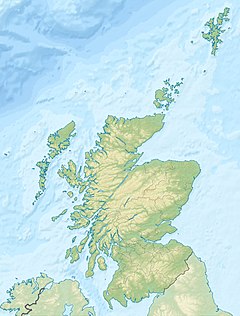Sandwood Bay
| Sandwood Bay Scottish Gaelic: Bàgh Shanabhait |
|
|---|---|

Sandwood Bay - north view
|
|
|
|
|
| Coordinates | 58°32′23″N 5°03′44″W / 58.5396°N 5.0623°WCoordinates: 58°32′23″N 5°03′44″W / 58.5396°N 5.0623°W |
Sandwood Bay (Scottish Gaelic: Bàgh Seannabhad) is a natural bay in Sutherland, on the far north-west coast of mainland Scotland. It is best known for its remote 1 mile (1.6 km) long beach and Am Buachaille, a sea stack, and lies about 5 miles (8.0 km) south of Cape Wrath. Behind the bay's large dunes, stretches the freshwater Sandwood Loch.
Though remote, and with no road access, the bay can be reached by a 4 miles (6.4 km) path leading from the gravel car park at the hamlet of Blairmore. Sandwood Bay is part of the Sandwood Estate which is run by the John Muir Trust. The beach is considered to be one of the cleanest and most unspoilt beaches in the whole of mainland Britain.
The name Sandwood Bay probably derives from the Viking name 'Sandvatn' ("sand water") and it is believed longboats were dragged across the sands into Sandwood Loch. There are also remains of Pictish settlement in the area. The area has been largely uninhabited since 1847 when the land was cleared for sheep farming as part of the Highland Clearances. A number of shepherds huts remained and were occasionally occupied until around 1940. On 30 September 1941, Sergeant Michael Kilburn from 124 Squadron at RAF Castletown was flying a Spitfire south west of Cape Wrath when the engine failed. He crash-landed the plane on the beach at Sandwood, and managed to escape uninjured. The wreck remained on the beach and over time the entire bodywork was eroded away by the sea but its engine, a Rolls Royce Merlin, remains largely intact and occasionally emerges into full view whenever tidal and weather conditions permit.
...
Wikipedia

